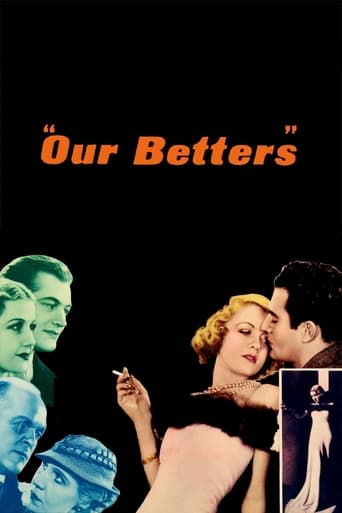richard-1787
I wonder how this played in 1933, when it opened, the bottom of the Depression? It's not clever. It's just a lot of very spoiled aristocrats or American nouveaux-riches pretending to be aristocrats, filling up their days with empty chatter and not much else. Occasionally one is hurtful, but not cleverly so. You could never mistake this for good Oscar Wilde. (I wonder if the original play, which had a success on Broadway, is any more interesting?) It reminds me of nothing so much as the sort of English drawing-room drama spoofed in *Auntie Mame* (I think it was called *Midsummer Madness* there.)Constance Bennett is very beautiful, but that's about all I can find to recommend here.
Ishallwearpurple
Our Betters (1933) Constance Bennett, Violet Kemble Cooper, Anita Louise, Alan Mowbray, Gilbert Rowland. A Somerset Maugham play, directed by George Cukor about the Lords and Ladies of British society, is amusing and biting at the same time. They have parties and weekends at someones estate, and gossip about who is sleeping with who, and learn all the latest dance steps. Lady Greystone has been 'educated' in her betters ways by her titled husband who she learned too late married her only for her money. While he spends all his time with his mistress, she gives lavish parties for her "betters." Soon she is the top hostess among the titled and idle set. Some wicked humor by Maugham, who was an invited guest to many of the same sort of places among the same sort of people. Bennett is dazzling in her wardrobe by Hattie Carnegie and Cooper is too funny trying to keep her gigolo from straying. And the final scene with a rouged and mincing dance instructor is very funny. As in any hard times, the depression era movie goer wanted something light and amusing and not deep and real. They saw 'real' everyday in their homes and on the streets. Kind of like today. 8/10
calvinnme
Constance Bennett plays Pearl, an heiress bride who, on her wedding day immediately after the ceremony, overhears her new husband tell his lover that he married Pearl only for her money as he and his lover are penniless. However, he does have a British title, and Constance goes to live in Britain with him, with their lavish lifestyle at first financed by her money. When that runs out, she has a lover who supplies her with cash.I generally watch these old films to escape the cynicism of today's world, and this film fails in that respect. The entire cast behaves in a despicable and inhuman manner like something out of ancient Rome, with the exception of Pearl's young sister Bessie, who is a wide-eyed innocent about to make the same mistake as Pearl did when she married her faithless husband. We all figure that Pearl behaving like a manipulative pleasure-addicted ice queen is rooted in her husband's betrayal, but nothing is said about motivation at all until the end of the film. George Cukor generally did a great job in these "women's films", especially if Katharine Hepburn was starring. But then Kate was such an excellent actress that she could get her motivation across without the use of explicit dialogue. Constance Bennett usually could do so too, so why things don't pan out here theatrically I have no idea.As an aside, it is interesting that Gilbert Roland and Constance Bennett play lovers in this and one other film from 1933 - "After Tonight" - yet don't marry until eight years later. I wonder if there's a story there?
blanche-2
Constance Bennett is a disillusioned socialite in "Our Betters," based on Somerset Maugham's play. Bennett plays a beautiful woman (in absolutely knockout gowns) who, on her wedding day, discovers that her husband has a mistress, a Charles-Diana-Camilla thing. Bennett's got the cash, and the girlfriend's poor. Constance, who plays Lady Pearl, throws herself into the London social scene, where nobody behaves. Her husband is always off with his girlfriend, and she has a lover who keeps her since her husband went through her money. And everyone else behaves the same way. The only thing that matters is knowing the right people, having money, getting invited to the right parties, and marrying titles. When Pearl's sister arrives from America, she's dazzled by the life and brushes off an old beau, played by Charles Starrett, who is the moral voice of the movie.This was the world of Elliot Templeton in "The Razor's Edge" and it's visited here fully with a brittle humor but not a great deal of energy. Bennett is perfect in her role. There are some scenes between Violet Kemble, who plays Minnie, and her much younger gigolo boyfriend, Gilbert Roland, where he manipulates her, that are overly long but quite funny. The final scene, with the dancing Ernest, is the best in the film.


